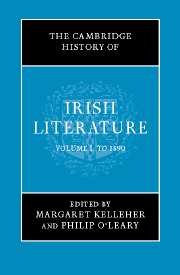Book contents
- Frontmatter
- Introduction
- 1 The literature of medieval Ireland to c. 800: St Patrick to the Vikings
- 2 The literature of medieval Ireland, 800–1200: from the Vikings to the Normans
- 3 The literature of later medieval Ireland, 1200–1600: from the Normans to the Tudors
- 4 Literature in English, 1550–1690: from the Elizabethan settlement to the Battle of the Boyne
- 5 Literature in Irish, c.1550–1690: from the Elizabethan settlement to the Battle of the Boyne
- 6 Prose in English, 1690–1800: from the Williamite wars to the Act of Union
- 7 Poetry in English, 1690–1800: from the Williamite wars to the Act of Union
- 8 Literature in Irish, 1690–1800: from the Williamite wars to the Act of Union
- 9 Theatre in Ireland, 1690–1800: from the Williamite wars to the Act of Union
- 10 Irish Romanticism, 1800–1830
- 11 Prose writing and drama in English, 1830–1890: from Catholic emancipation to the fall of Parnell
- 12 Poetry in English, 1830–1890: from Catholic emancipation to the fall of Parnell
- 13 Literature in Irish, 1800–1890: from the Act of Union to the Gaelic League
- 14 Historical writings, 1690–1890
- 15 Literature and the oral tradition
- Guide to major subject areas
- Index
- References
7 - Poetry in English, 1690–1800: from the Williamite wars to the Act of Union
Published online by Cambridge University Press: 28 March 2008
- Frontmatter
- Introduction
- 1 The literature of medieval Ireland to c. 800: St Patrick to the Vikings
- 2 The literature of medieval Ireland, 800–1200: from the Vikings to the Normans
- 3 The literature of later medieval Ireland, 1200–1600: from the Normans to the Tudors
- 4 Literature in English, 1550–1690: from the Elizabethan settlement to the Battle of the Boyne
- 5 Literature in Irish, c.1550–1690: from the Elizabethan settlement to the Battle of the Boyne
- 6 Prose in English, 1690–1800: from the Williamite wars to the Act of Union
- 7 Poetry in English, 1690–1800: from the Williamite wars to the Act of Union
- 8 Literature in Irish, 1690–1800: from the Williamite wars to the Act of Union
- 9 Theatre in Ireland, 1690–1800: from the Williamite wars to the Act of Union
- 10 Irish Romanticism, 1800–1830
- 11 Prose writing and drama in English, 1830–1890: from Catholic emancipation to the fall of Parnell
- 12 Poetry in English, 1830–1890: from Catholic emancipation to the fall of Parnell
- 13 Literature in Irish, 1800–1890: from the Act of Union to the Gaelic League
- 14 Historical writings, 1690–1890
- 15 Literature and the oral tradition
- Guide to major subject areas
- Index
- References
Summary
In December 1690, five months after the Battle of the Boyne, a little-known Dublin printer called John Brett printed the first poem of what was to be a golden age for Irish verse in English. The grandiloquent and florid ‘Ode to the King on his Irish Expedition’ was intended to flatter the unattractive but victorious Dutchman whom the Protestants of Ireland were hailing as their ‘Providential deliverer’ from the horrors of popery and tyranny under Jacobite rule.
What can the Poet’s humble Praise?
What can the Poet’s humble Bays?
(We Poets oft our Bays allow,
Transplanted to the Hero’s Brow)
Add to the Victor’s Happiness?
asked the poet, in a flourish of rhetorical exuberance. Whatever William of Orange might have answered to these – and many other similarly euphuistic – questions, the poet (a 23-year-old graduate of Trinity College, Dublin named Jonathan Swift) hoped that this – his first printed work – would be sufficiently well regarded by those around the king to bring him some reward for the trouble of writing it, and presumably for the expense of having it printed. Even though, it seems, nothing came of Swift’s efforts to attract patronage by the poem, the verse itself marks an important moment in the history of Irish poetry. Not only is it the first appearance in print of the poet who was to dominate Irish poetry in English for the first half of the eighteenth century, but it is also the first poem of the new Williamite era, one in which peace and prosperity in Ireland would provide a nurturing environment not only for the writing and reading of verse but for its printing. Between the Battle of the Boyne and the Act of Union, the muse of poetry was very busy in Ireland.
- Type
- Chapter
- Information
- The Cambridge History of Irish Literature , pp. 282 - 319Publisher: Cambridge University PressPrint publication year: 2006
References
- 4
- Cited by

